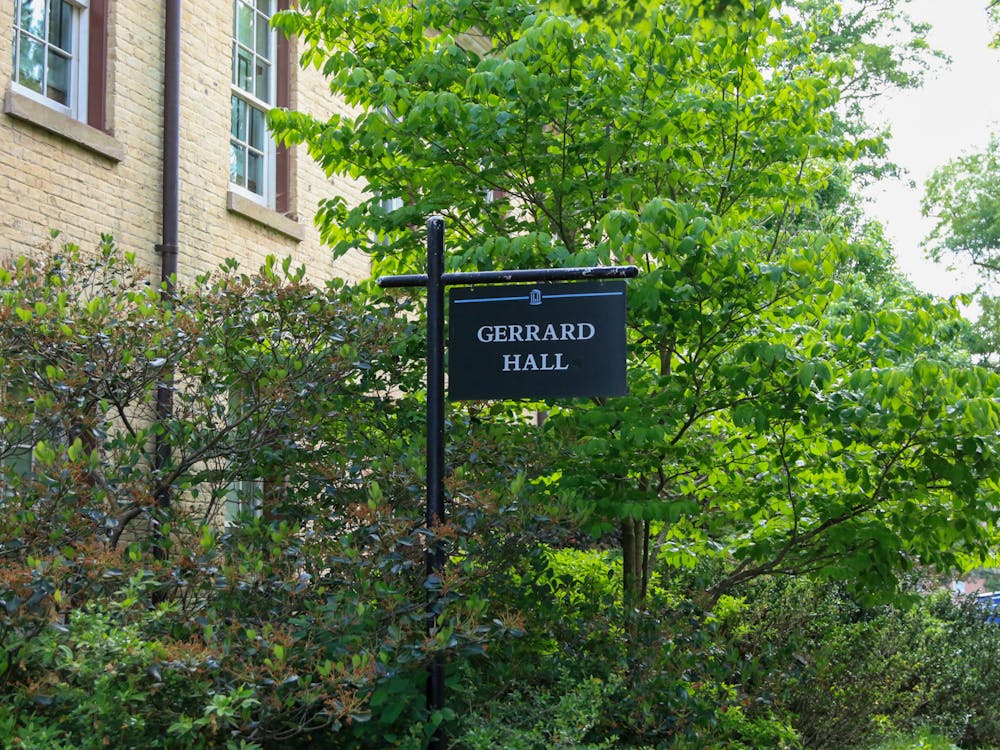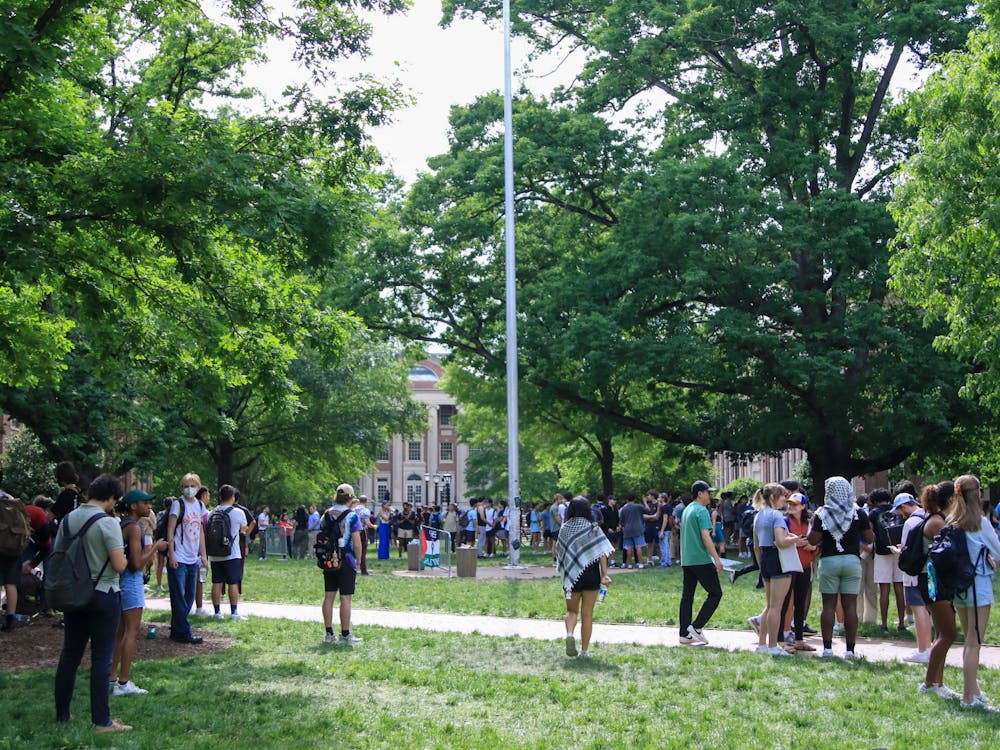A Duke faculty member said she was arrested alongside other demonstrators at the University of North Carolina at Chapel Hill’s campus Tuesday morning after taking part in the “Triangle Gaza Solidarity Encampment.”
UNC Media Relations later wrote in a Thursday email to The Chronicle that 36 protesters were detained Tuesday morning, 30 of which were cited for trespassing and released on-site. The remaining six were arrested and transported to the Orange County Magistrates Office, where they were “charged with trespassing and later released on a written promise to appear.”
UNC Media Relations added that 10 of those cited for trespassing are current UNC-Chapel Hill students and the other 20 are “not affiliated with the university.” Of the six taken before the Orange County Magistrate, they wrote that three are UNC students and three are unaffiliated.
As of Thursday afternoon, UNC Police has still not responded to The Chronicle’s request for the arrest and citation records.
The Triangle Gaza Solidarity Encampment at UNC was established April 26 as a joint effort by the UNC, Duke and North Carolina State University chapters of SJP, according to an April 26 post on Duke SJP’s Instagram.
Some Duke community members joined the encampment after protesting Friday morning on Abele Quad to demand the University divest from its holdings in Israel, call for a cease-fire and improve freedom of speech protections on campus.
Duke faculty member arrested
Emily Rogers, assistant professor of cultural anthropology, told The Chronicle that she was arrested Tuesday morning at the UNC encampment.
“I was standing between the cops and the center of the encampments, which is where people were trying to hold the line and protect,” Rogers said. “ … I stood between the students and the police. I was simply standing there. I was not using any form of object to block the police.”
Rogers claims that she “surrendered to arrest.”
Rogers said that she is disabled and has a joint disorder, noting that she uses a cane to walk around. The disorder, she explained, makes it easy for her joints to dislocate.
“I told the police that I was disabled and that I needed the cane,” Rogers said.
A video taken shortly after the arrest, posted by Rogers on X, shows her being escorted by a police officer who was holding her cane.
“They took my cane when they arrested me,” Rogers said in the video.
Rogers told The Chronicle that “[she] was zip tied pretty tightly.” She later explained that she “partially dislocated” her left shoulder and has “a lot of pain” in her ribcage.
Rogers explained that she was taken into an administrative building where they released her first. She added that she received a ticket for “trespassing on public property.”
The UNC Police Crime Log lists three incidents that occurred at 6 a.m. Tuesday at Polk Place and were reported at 7:53 a.m. The descriptions listed included trespassing, assault on a government official and “resist delay obstruct” — all of which were “cleared by arrest.”
A fourth incident of “assault” occurred at 4 p.m. at Polk Place. It was reported at 5:22 p.m. and remains an open case.
UNC Police did not respond to The Chronicle’s request for access to the arrest reports in time for publication.
“As a faculty member, my goal was to protect students who are more vulnerable than I am because students can be subject to disciplinary policies — especially UNC students who could be suspended,” Rogers said.
Get The Chronicle straight to your inbox
Sign up for our weekly newsletter. Cancel at any time.
According to Rogers, Duke undergraduate and graduate students were among those arrested.
“As a faculty member, I feel a responsibility to be there for my students,” Rogers said. She noted that the UNC students participating in the encampment, some of whom were seniors, could face “not graduating” or “losing access to their dorms” as repercussions for their involvement in the demonstration.
Rogers claimed that colleagues in the anthropology department have been “super supportive” in making sure that she is “okay” and has her transportation and health needs met.
Duke administration did not respond for comment about the arrests in time for publication.
The UNC encampment
Pro-Palestinian encampments have emerged on college campuses around the country in recent weeks, with students calling on their universities’ administrations to divest from holdings in Israeli companies in response to the Israel-Hamas war.
UNC students’ demands included acknowledging “the ongoing genocide in Palestine,” full transparency of UNC investments, divestment from companies “complicit in this genocide” and ending UNC’s study abroad programs to Israel, according to an April 26 Instagram post by UNC SJP.
Students at UNC previously set up an encampment April 19 outside of South Building — where a number of administrative offices are located — in solidarity with over 100 students at Columbia University who were arrested by the New York Police Department the day before. The UNC demonstration concluded by mid-afternoon.
The “Triangle Gaza Solidarity Encampment” was entering its fifth day when UNC Police detained approximately 36 people at 6 a.m. Tuesday. According to a Tuesday statement by UNC administrators, Polk Place was cleared of protesters “in approximately 45 minutes,” and UNC Facilities cleared the area of “significant debris” soon after.

The detainees were relocated to Gerrard Hall, where they were kept for multiple hours as police — many in full riot gear — were stationed outside in a stand-off with student protesters. Six of those detained were arrested and transported to the Orange County Detention Center’s magistrate office. They were released by 10 a.m., according to a statement by the UNC Greensboro chapter of Students for Justice in Palestine.
“We are disappointed that we had to take action this morning regarding protesters, including many who are not members of the Carolina community, who violated state law and University policies that provide for peaceful demonstration,” wrote Lee Roberts, UNC interim chancellor, and Christopher Clemens, UNC provost, in a Tuesday statement to the university community.
Roberts and Clemens had previously issued a statement at 5:30 a.m. that mandated protesters “remove all tents, tables and other items and depart” from Polk Place by 6 a.m. They added that failure to comply would result in “consequences including possible arrest, suspension from campus and, ultimately, expulsion from the university, which may prevent students from graduating.”
The officials cited Section II.D.2 of the Facilities Use Standard, which states that “no temporary Structures whatsoever shall be erected or placed on lawn space beneath the drip lines of trees.”
Police officers from other schools — including UNC-Wilmington, Appalachian State University and North Carolina Central University, among others — were also present during Tuesday’s demonstration. Representatives from the Chapel Hill Police Department told The Chronicle that they were not involved in the arrests.
By 9 a.m., police forces had set up barricades around the flagpole in the center of Polk Place, where the encampment had previously been located. Hundreds of protesters later converged on the quad around noon, chanting “intifada revolution, there is only one solution.”
Around 2 p.m., a number of students removed barricades around the flagpole and replaced the American flag with a Palestinian flag. Roberts later restored the American flag, flanked by police officers who forcibly removed students guarding the flagpole.

UNC began operating at Condition 2 of Adverse Conditions at 3:16 p.m. “due to [Tuesday’s] demonstrations on campus,” meaning classes were canceled for the remainder of the day and non-mandatory operations were suspended.
According to Roberts and Clemens, protesters “backtracked on their commitment to comply” with the university’s “reasonable time, manner and place policies” Sunday evening, prompting administrative officials to later call in police forces. Prior to that point, they felt administrators had “maintained a healthy and constructive dialogue with students and others who came to campus to make their voices heard.”
“No one has the right to disrupt campus operations materially, nor to threaten or intimidate our students, nor to damage and destroy public property,” Roberts and Clemens wrote.
Editor’s note: This article was updated at 2:10 p.m. Thursday with additional details surrounding the 36 detained demonstrators provided by UNC Media Relations in a May 2 email to The Chronicle.

Michael Austin is a Trinity junior and managing editor of The Chronicle's 120th volume.

Zoe Kolenovsky is a Trinity junior and news editor of The Chronicle's 120th volume.

